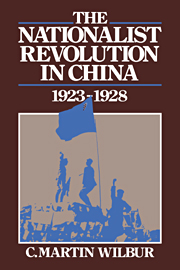Book contents
- Frontmatter
- Contents
- List of maps
- Acknowledgements
- Creating a revolutionary movement
- Competition and dissension within
- The drive to unify China – first phase
- Conflict over revolutionary goals
- Mounting problems for the Wuhan regime
- The communists turn to rebellion
- The final drive – Peking captured and Nanking the new capital
- Bibliographical essay
- Bibliography
- Index
Competition and dissension within
Published online by Cambridge University Press: 18 December 2009
- Frontmatter
- Contents
- List of maps
- Acknowledgements
- Creating a revolutionary movement
- Competition and dissension within
- The drive to unify China – first phase
- Conflict over revolutionary goals
- Mounting problems for the Wuhan regime
- The communists turn to rebellion
- The final drive – Peking captured and Nanking the new capital
- Bibliographical essay
- Bibliography
- Index
Summary
Aborted counter-revolution
Counter-revolution showed its hand on 20 August 1925 in the assassination of Liao Chung-k'ai, an ardent supporter of Sun's alliance with Soviet Russia and his efforts to mobilize the masses. Immediately after the tragedy, Borodin proposed the formation of a special committee of three with full powers to deal with the crisis. Hsu Ch'ung-chih, Wang Chingwei and Chiang Kai-shek made up the triumvirate, with Borodin as adviser. Investigations revealed a plot among a group of conservative Kuomintang leaders and some commanders in the Kwangtung Army to overthrow the radicals in the Canton power establishment. Within a week many suspects were arrested, some executed, while others of the plotters had fled. Chiang and Borodin decided to send Hu Han-min to Russia, and within a month Chiang Kai-shek expelled his rival, Hsu Ch'ung-chih, titular commander of the Kwangtung Army. Two party veterans who obstructed the expansion of Russian influence, Lin Sen and Tsou Lu, were sent north on a ‘diplomatic mission’. These men later became leaders of a prestigious faction within the Kuomintang opposing the remaining leadership in Canton.
There were other important consequences of the crisis. Wang Ching-wei and Chiang Kai-shek became key figures in the revolutionary movement and for six months held greatest influence in the Canton regime. The military forces upholding the regime were reorganized into five corps of the National Revolutionary Army: First Corps from the Party Army, commanded by Chiang Kai-shek; Second Corps of Hunanese, commanded by T'an Yen-k'ai; Third Corps of Yunnanese, Commanded by Chu P'ei-te; Fourth Corps drawn from the Kwangtung Army, placed under the command of Li Chi-shen; and Fifth Corps made up of Li Fu-lin's private army.
- Type
- Chapter
- Information
- The Nationalist Revolution in China, 1923–1928 , pp. 27 - 49Publisher: Cambridge University PressPrint publication year: 1984



